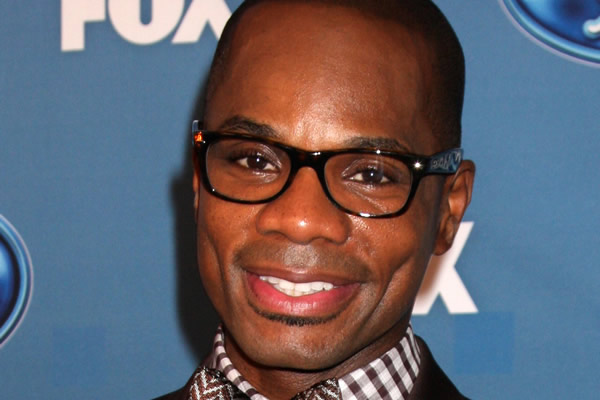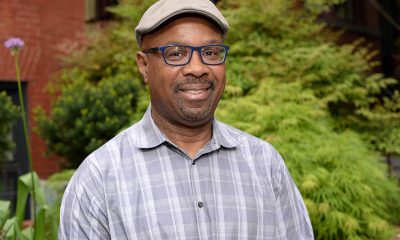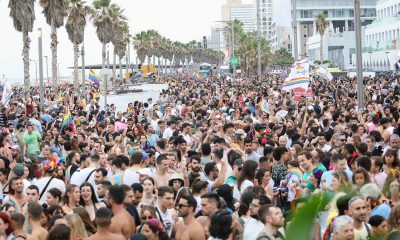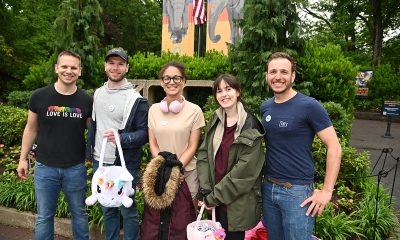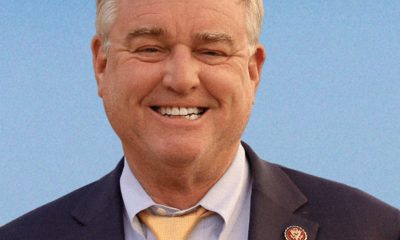Local
D.C. paid anti-gay gospel singer $80,000
Kirk Franklin performed at Emancipation Day event in April
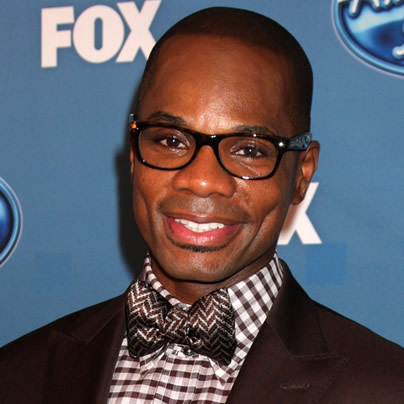
LGBT activists have expressed concern that the D.C. government paid $80,000 this year for a performance at the city’s annual Emancipation Day celebration by a gospel singer who has publicly called for gays to abandon the “homosexual lifestyle.”
Internationally acclaimed gospel singer and musician Kirk Franklin, the winner of seven Grammy Awards, gave an outdoor concert April 16 in Freedom Plaza in downtown Washington as part of this year’s Emancipation Day festivities.
“He has a First Amendment right to say whatever he believes,” said Earl Fowlkes, president and CEO of the Center for Black Equity, which advocates for the black LGBT community.
“However, I would not want my tax dollars to go to anyone who espouses which is in essence homophobia any more than I would want my tax dollars to go toward anyone who espouses racism or who was anti-Semitic,” Fowlkes told the Blade. “It’s just not appropriate.”
Although Franklin, 43, reflects his deeply held Christian beliefs in his songwriting and performances, his comments about LGBT people and homosexuality have surfaced mostly in media interviews and in his 2010 book, “The Blueprint: A Plan for Living Above Life’s Storms.”
In most of his comments on the subject, Franklin has called on the church to treat LGBT people with kindness, compassion and love but has insisted “we can never compromise what the Bible says about homosexuality,” as stated in his book.
When he was asked in an Associated Press interview what he sees in the future for the LGBT community in the black church, Franklin reiterated his theme of compassion along with change.
“I think that you have to be, as Scripture would say, ‘as wise as a serpent and as harmless as a dove’ to lovingly share the truth, to lovingly and to passionately speak the truth in love into the lives of all people to allow that message that you speak…trust that it has enough power to do the changing,” the AP quoted him as saying.
The decision to bring Franklin to D.C. for the Emancipation Day event was made by the office of D.C. Council member Vincent Orange (D-At-Large), which has organized and promoted the event since Orange persuaded the Council and city officials to host and sponsor Emancipation Day as an annual city event.
Legislation introduced by Orange and approved by the Council and mayor has made Emancipation Day, which commemorates the freeing of the slaves in the District of Columbia during the Civil War, as an official city holiday.
The total cost of this year’s event, which included a parade as well as entertainment, was $250,000, according to the Washington Post. The Post reported that, “Franklin traveled to the District with a 16-person entourage, including backup singers, …. In addition to Franklin’s $55,000 booking fee, city taxpayers spent $8,758 for airfare, $1,557 for his limousine and $8,721 to put Franklin and his entourage up at the JW Marriott hotel in Washington, including $2,600 for Franklin’s VIP suite. Records attributed $4,215 in food and beverage costs to the entourage.”
Orange has proposed increasing the budget to $350,000 for next year, the Post reported.
“I’m sure that in the decision of securing Mr. Franklin the Council member was not aware of any anti-gay or anti-human rights comments that he might have made,” said James Brown, Orange’s chief of staff.
“The Council member is a strong supporter of the gay community,” he said.
Brown said Orange was out of town this week and couldn’t immediately be reached but would be available for comment upon his return. According to Brown, plans for next year’s Emancipation Day event won’t begin until after the Council returns from its summer recess in September.
Ron Hill, an official associated with the RCA Inspiration recording label who serves as Franklin’s manager in Grapevine, Texas, a Dallas suburb, didn’t return calls seeking an interview with Franklin.
Wayne Besen, founder and leader of Truth Wins Out, a national LGBT organization that monitors efforts by religious groups to help gays change their sexual orientation to heterosexuality through a process known as “conversion therapy,” said many of the advocates of that debunked process have changed their rhetoric and public statements in recent years.
Besen said on the heels of overwhelming scientific evidence that conversion therapy doesn’t work and is harmful to people who undergo such treatment, many of the groups promoting the treatment have dropped their previous harsh rhetoric condemning homosexuality as being evil and calling gay people sinners condemned to hell.
“What we have from people like Kirk Franklin and others is an exercise in double- speak and dishonesty,” Besen said. “But their message is the same – gay people are inferior and we should punish them. As we’re enacting punitive laws and conferring second-class citizenship on them we’re going to sugarcoat it and tell them that we love them.”
Rev. MacArthur Flournoy, director of the Human Rights Campaign’s Faith Partnership Mobilization program, said he, too, supports Franklin’s right to his own views on the subject of homosexuality.
Similar to Fowlkes, Flournoy said he also is concerned that city funds were used to finance Franklin’s appearance.
“To bring someone to an event that symbolizes freedom and the removal of oppression and celebrating freedom and it’s paid for with taxpayer dollars who’s going to espouse a perspective that is oppressive – that’s problematic,” Flournoy told the Blade.
“I think it would help us to get Kirk Franklin, sit him down and have a conversation with him, hear his perspective, hear what his thinking is and simply share what we know to be true,” said Flournoy.
“But at the end of the day, we simply don’t support the use of taxpayer dollars to bring in someone who clearly espouses a perspective that is detrimental to folks and their mental and spiritual health,” he said.
Rev. Cathy Alexander, minister for congregational connections at D.C.’s Metropolitan Community Church, which reaches out to the LGBT community, said she would urge Orange’s office to consider inviting a representative of the LGBT community to help in the selection process for future performers or speakers at the Emancipation Day event.
“My personal statement would be I would certainly hope there would be a conversation around who may be coming on the city’s behalf for an official function recognizing especially emancipation,” she said.
“In my view, we’re honoring the past, the present, and the future of emancipation, Alexander said. “And freedom comes in all forms.”
Joseph Kitchen, a 26-year-old Baptist minister and Prince George’s County Democratic Party activist who’s gay, said he has met Franklin several times at religious functions.
Kitchen, who campaigned for Maryland’s marriage equality law in last year’s referendum election, called on LGBT activists to be cautious about overreacting to situations similar to that surrounding Franklin’s performance at D.C.’s Emancipation Day celebration.
“If Kirk Franklin was a bigot, if he was someone who has espoused hateful feelings toward homosexuals or who had opposed their rights and fairness and equality before the law, then I think that would be different,” he said. “But he has not ever done that.”
Added Kitchen, “He was asked a theological question in a biblical setting and he answered it in the way in which he has been taught. And I think some people just need to understand that.”
Maryland
Trone, Alsobrooks battle it out in Md.
Winner of May 14 Democratic primary will face Hogan in November
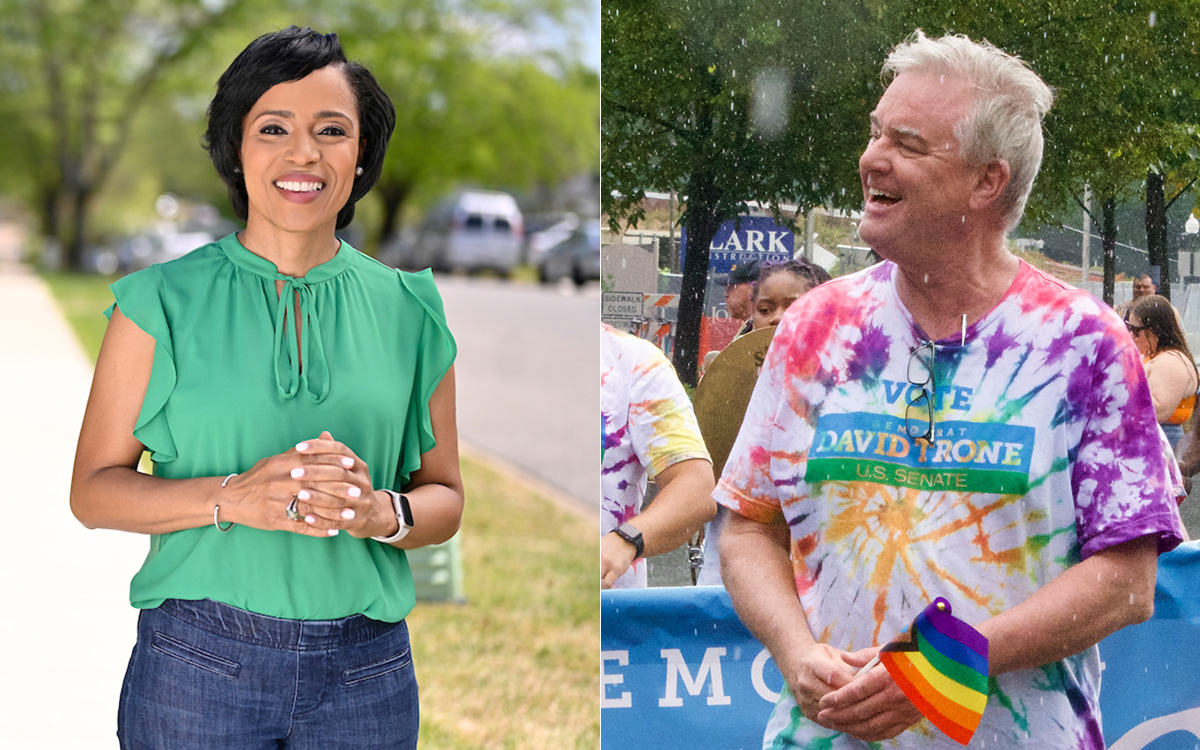
The two Democrats who are running to succeed retiring U.S. Sen. Ben Cardin (D-Md.) told the Washington Blade they would champion LGBTQ rights in the U.S. Senate.
Congressman David Trone is a member of the LGBTQ+ Equality Caucus and co-sponsored the Equality Act, which would add sexual orientation and gender identity to federal civil rights law.
Trone voted in favor of the Respect for Marriage Act and co-sponsored a U.S. House of Representatives resolution in support of transgender rights. Trone helped secure $530,000 in grants from the Department of Homeland Security to develop violence prevention programs for LGBTQ youth in Montgomery County. He has also participated in Pride marches and other LGBTQ-specific events in his district that stretches from northern Montgomery County to Garrett County in western Maryland.
Trone during a telephone interview with the Blade on May 1 noted Republicans voted for the Respect for Marriage Act, which codified marriage equality in federal law.
“It’s about having to be able to personally connect with folks on the other side of the aisle,” said Trone.
“What I found successful to me is building a personal relationship and telling stories about my life,” he added.
Trone during the interview disclosed his niece is trans, and attended Furman University in South Carolina. He said he donated $10 million to the school that he attended as an undergrad to “build out their mental health capacity, which I felt was a way that she could have the best mental health care possible when she worked her way through (her) transition.”
Trone said his company, Total Wine & More, began to offer benefits to employees’ same-sex partners nearly 30 years ago. He told the Blade he implemented the policy after a female employee said her partner was unable to get health insurance.
“I didn’t really think much about it, because I didn’t realize that her partner was another woman,” recalled Trone. “She explained to me that she was another woman and couldn’t get married, and I said, well, we’ll figure that out, so I went down to human resources and found that you can change your policy.”
Maryland voters in 2012 approved the state’s same-sex marriage law.
Prince George’s County Executive Angela Alsobrooks was the county’s state’s attorney when voters upheld the marriage equality law.
She supported the law and attended a pro-Question 6 fundraiser at state Del. Anne Kaiser (D-Montgomery County)’s home ahead of the referendum. The Montgomery County Democrat’s now wife worked with Alsobrooks when she was state’s attorney, and she toasted them at their 2013 wedding.
Alsobrooks during an April 29 interview at the Blade’s office noted Prince George’s County offers PrEP to LGBTQ people and other communities “that need the opportunity to protect themselves.”
She, like Trone, supports the Equality Act, noting it “does provide the opportunity to not experience discrimination in a number of forums.” Alsobrooks also discussed the need to “protect the courts.”
“The one thing that former President Trump did was to stack the courts with judges who make decisions that have taken away the rights of many people, including the LGBTQ community,” she told the Blade.
Alsobrooks also said she would like to be on the Senate Judiciary Committee to “make sure that we are not appointing these conservative, activist judges who want to make decisions and choices that do not belong to them … and are determined, I think, to remove freedom from so many.”
Prince George’s County Councilwoman Krystal Oriadha, a bisexual woman who supports Trone, last June criticized the decision not to hold a ceremony for the raising of the Pride flag over the county administrative building in Upper Marlboro.
Pastor John K. Jenkins, Sr., of First Baptist Church of Glenarden, the Upper Marlboro church that Alsobrooks attends, in 2012 urged his congregants to vote against Maryland’s marriage equality law. Shirley Caesar, a well-known gospel singer, during a 2017 appearance at the church defended Kim Burrell, another gospel singer who referred to the “perverted homosexual lifestyle” in an online sermon that has been removed from YouTube and social media.
Alsobrooks’s campaign in an earlier statement to the Blade said she “does not agree with those sentiments.”
Primary winner to likely face Hogan
Early voting in Maryland began on May 2.
Campaign finance reports indicate Trone has loaned his campaign more than $54 million. Alsobrooks has raised more than $7 million.
A poll that Goucher College conducted with the Baltimore Banner between March 19-24 found 42 percent of likely Democratic voters will vote for Trone, compared to 33 percent who said they will cast their ballot for Alsobrooks. Nearly a quarter of poll respondents said they were undecided.
An Emerson College Polling/The Hill/DC News Now poll released on Thursday notes Alsobrooks is now ahead of Trone by a 42-41 percent margin with a 2.9 percent margin of error. The poll was conducted between Monday and Wednesday.
The winner of the May 14 primary will most likely face off against Republican former Gov. Larry Hogan, who entered the race in February.
Alsobrooks would become the first Black woman to represent Maryland in the U.S. Senate if she were to win in November. She told the Blade that Maryland “is going to be one of the states” that will determine whether Democrats will retain control of the chamber.
“That issue of choice was also squarely featured because of his (Hogan’s) well-known position as a person who is not pro-choice,” she said, referring to abortion that has emerged as a top campaign issue after the U.S. Supreme Court in 2022 struck down Roe v. Wade. “It really energized a lot of people who are now really leaning in and are committed to making sure that we keep Maryland blue, and by extension that we elect people who will protect a woman’s right to choose, protect reproductive freedom.”
Trone told the Blade that he is the candidate who can defeat Hogan in November.
“I have a track record of progress and passing bills in the House for three sessions,” said Trone. “I’ll be able to beat Larry Hogan.”
Candidates attacked over insensitive comments, campaign spending
Trone and Alsobrooks in recent weeks have intensified their attacks against each other.
Somerset Mayor Jeffrey Slavin and other elected officials who have endorsed Alsobrooks over the past weekend publicly criticized Trone after he told NBC Washington last week that people who have backed her are “low level.”
Trone in March apologized after he used a racial slur during a House Budget Committee hearing.
Alsobrooks’s campaign did not publicly respond to the comment. Alsobrooks herself pointed out to the Blade that Trone during a debate said he gave money to U.S. Reps. Lucy McBath (D-Ga.) and Lauren Underwood (D-Ill.), describing them as “great diversity candidates.” (Trone later said he meant to say “diverse candidates.”)
“We are not diversity candidates,” said Alsobrooks. “These are qualified congresswomen.”
Alsobrooks also noted Trone has given money to anti-LGBTQ Republicans.
Campaign finance records indicate Trone and/or his wife have previously supported anti-LGBTQ Republicans. These include a $38,000 donation to Texas Gov. Greg Abbott’s election campaign in 2014, two $4,000 contributions to former North Carolina Gov. Pat McCrory in 2008 and 2012 and $2,500 to U.S. Sen. Tom Tillis (R-N.C.).
Total Wine & More between 2007-2022 contributed $272,971 to Republican officials, candidates and state parties. Trone in 2015 stepped down as the company’s CEO.
Trone in response to Alsobrooks’s criticism noted his company has more than 1,000 employees in Texas. Trone also defended his company and the way that he has “always put my people first.”
“If you put your people first, you’re going to take care of your people with full time wages, wages with benefits, insurance, health care, all those things,” he said. “Republicans attack us in all these states, then they have the audacity to ask for money in those states, and that’s where the company is put between a rock and a hard place.”
“That’s why we want to get this money out of politics,” added Trone. “Get these people out (of) there asking for money.”
Trone said he has given more than $20 million to Democrats.
“The fact that the company works to protect the jobs of people in Tennessee, and in South Carolina, (works) on issues that are not related to abortion, issues that are not at all related to LGBTQ+ issues that are related to the business; I keep them open,” he told the Blade. “They’d like to conflate the world to their advantage.”
Trone noted he was not “born rich” and attended public school, while Alsobrooks “went to private school.” Trone also described Alsobrooks to the Blade as a “career politician.”
Governor Wes Moore; Lt. Gov. Aruna Miller; U.S. Sen. Chris Van Hollen; former U.S. Sen. Barbara Mikulski, U.S. Reps. John Sarbanes, Glenn Ivey, Steny Hoyer, Kweisi Mfume and Jamie Raskin; state Sen. Mary Washington (D-Baltimore City); former state Del. Maggie McIntosh (D-Baltimore City); Baltimore Mayor Brandon Scott; and Howard County Registrar of Wills Byron Macfarlane are among the elected officials who have endorsed Alsobrooks.
“She was for marriage equality before it was cool to be for marriage equality,” Kaiser told the Blade late last year.
Attorney General Anthony Brown, Prince George’s County State’s Attorney Aisha Braveboy and gay state Dels. Ashanti Martinez (D-Montgomery County) and Kris Fair (D-Frederick County) are among those who have endorsed Trone.
“Congressman David Trone has been an unwavering supporter of LGBTQ+ rights since his first year in office,” Fair told the Blade on Tuesday in a statement. “He has been a vocal and visible leader, showing up in queer spaces and being an active listener and facilitator.”
Gay state Del. Joe Vogel (D-Montgomery County), who is running for Trone’s seat in Congress, has also endorsed him.
District of Columbia
Billy Porter, Keke Palmer, Ava Max to perform at Capital Pride
Concert to be held at annual festival on June 9
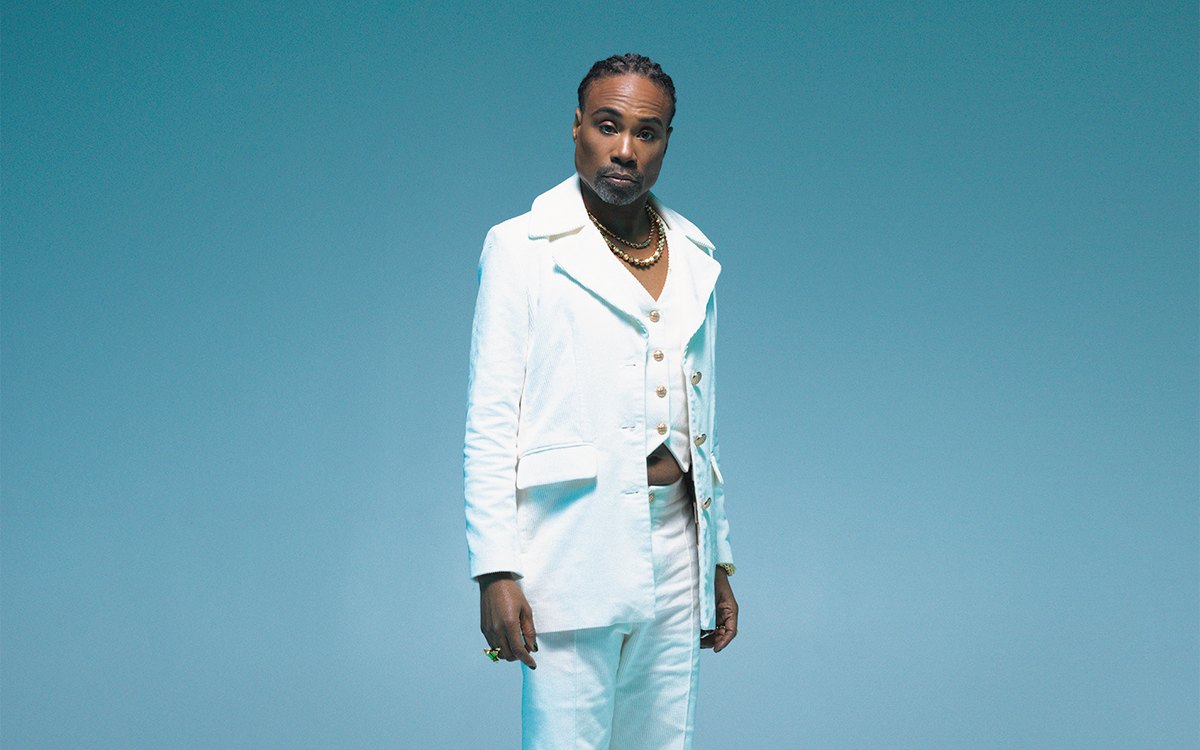
The Capital Pride Alliance, the group that organizes D.C.’s annual LGBTQ Pride events, announced this week the lineup of performers for the Sunday, June 9, Capital Pride Concert to be held during the Capital Pride Festival on Pennsylvania Avenue, N.W. near the U.S. Capitol.
Among the performers will be nationally acclaimed singers and recording artists Billy Porter and Keke Palmer, who will also serve as grand marshals for the Capital Pride Parade set to take place one day earlier on Saturday, June 8.
The Capital Price announcement says the other lead performers will be Ava Max, Sapphira Cristal, and the pop female trio Exposé.
“The beloved pop icons will captivate audiences with upbeat performances coupled with their fierce advocacy for LGBTQ+ rights, echoing the vibrant spirit of this year’s theme, ‘Totally Radical,’” according to a statement released by Capital Pride Alliance.
“With Billy Porter and Keke Palmer leading the parade as Grand Marshals, we’re not only honoring their incredible contributions to the LGBTQ+ community but also amplifying their voices as fierce advocates for equality and acceptance,” Capital Pride Alliance Executive Director Ryan Bos said in the statement.
“The concert and festival serve as a platform to showcase the diverse array of LGBTQ+ talent, from the chart-topping hits of Ava Max to the iconic sounds of Exposé and the electrifying performances of Sapphira Cristal,” Bos said in the statement. “Capital Pride 2024 promises to be a celebration like no other.”
The concert will take place from 12-10 p.m. on the main stage and other stages across the four-block long festival site on Pennsylvania Avenue.
Arts & Entertainment
Washington Blade’s Pride on the Pier and fireworks show returning June 8
The annual Pride on the Pier Fireworks Show presented by the Leonard-Litz Foundation will take place on Saturday, June 8 at 9 p.m.

The Washington Blade, in partnership with LURe DC and The Wharf, is excited to announce the 5th annual Pride on the Pier and fireworks show during D.C. Pride weekend on Saturday, June 8, 2024, from 2-10 p.m.
The event will include the annual Pride on the Pier Fireworks Show presented by the Leonard-Litz Foundation at 9 p.m.
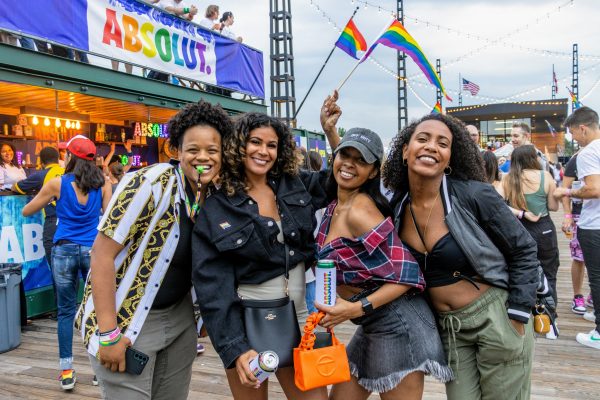
Pride on the Pier extends the city’s annual celebration of LGBTQ visibility to the bustling Southwest waterfront with an exciting array of activities and entertainment for all ages. The District Pier will offer DJs, dancing, drag, and other entertainment. Alcoholic beverages will be available for purchase for those 21 and older. Local DJ’s Heat, Eletrox and Honey will perform throughout the event.
3 p.m. – Capital Pride Parade on the Big Screen
3:30 p.m. – Drag Show hosted by Cake Pop!
9 p.m. – Fireworks Show Presented by Leonard-Litz Foundation
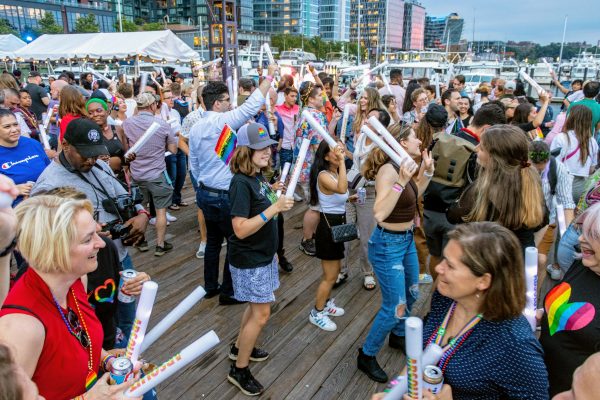
The event is free and open to the public. The Dockmasters Building will be home to a VIP experience. To learn more and to purchase tickets go to www.prideonthepier.com/vip. VIP tickets are limited.
Event sponsors include Absolut, Buying Time, Capital Pride, DC Brau, DC Fray, Burney Wealth Management, Infinate Legacy, Leonard-Litz Foundation, Mayor’s Office of LGBTQ Affairs, MISTR, NBC4, The Wharf. More information regarding activities will be released at www.PrideOnThePier.com

